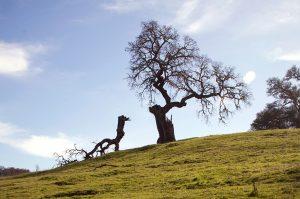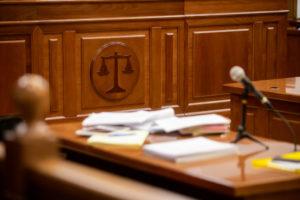
Everything You Wanted To Know About Tree Law
Until recently, if someone mentioned they had a tree law issue, most people would assume they were talking about the classic dispute between two neighbors over a tree that extends onto both properties.
But after a teen was significantly injured when an oak branch fell on top of him in Jackson Square in June of 2023, the question of what laws actually govern trees is being asked a lot. Who is liable if you’re injured by a tree? What happens if you hit a tree? Which neighbor should prevail in a dispute about a shared tree? Does Louisiana have any weird tree laws?
Below we’ll take a look at tree law across the Gulf South.
Tree Law: The Basics
Most tree injuries happen in one of two ways: a tree falls onto a person or a person falls from a tree. A 2023 study revealed that while the likelihood of being injured by a falling tree is pretty low, the injuries tend to be rather severe when it happens. There is also the possibility of crashing a vehicle into a tree, which can cause both significant property damage and physical injuries because most trees are large, immovable objects. Sometimes, the person who owns the property where the tree is located will be liable. Often, however, other parties like maintenance companies and arborists could be responsible for injuries as well. In car accidents involving trees, sometimes even the Department of Transportation can be held liable for failing to ensure the roadway is safe.
Who is liable for the damages when a tree falls onto a person or vehicle?
Injuries caused by falling trees and limbs are rare, but certainly not unheard of. For example, in Louisiana, these cases are governed by La. C.C. art. 2317.1, which states:
The owner or custodian of a thing is answerable for damage occasioned by its ruin, vice, or defect, only upon a showing that he knew or, in the exercise of reasonable care, should have known of the ruin, vice, or defect which caused the damage, that the damage could have been prevented by the exercise of reasonable care, and that he failed to exercise such reasonable care.
This law means that to hold someone liable for an injury caused by a falling tree or branch, the injured person must prove four elements:
- That the tree or branch was defective,
- The defendant knew or should have known of the defect,
- The defendant could have prevented the injury somehow, and
- The tree or branch caused the injuries.
For a free legal consultation, call 800-537-8185
In tree cases, it’s sometimes difficult to prove that a tree was “defective,” and also that the defendant knew about this defect before the fall. However, if the tree showed obvious signs of decay or was otherwise damaged before the accident, this could provide evidence that the defendant should have known about this defect and could have prevented the injury.
In most states, the same laws will apply whether the tree fell directly onto a person, or onto a car that was traveling under the tree.
What happens if you’re hurt falling from a tree?
If someone is hurt falling from a tree, an insurance company or court will first look at why the person was on the property. If the victim was working in the tree, their injuries may be covered by Workers’ Compensation or another insurance policy.
When a guest is injured by a tree in Louisiana, the standard discussed above will apply. In other states, such as Mississippi, the court will classify whether the person was “an invitee, licensee, or a trespasser,” before determining what the tree owner’s duty of care is.
Click to contact our personal injury lawyers today
When a child is hurt falling from a tree, there may also be claims that the tree was an “attractive nuisance.” Most states have special laws that will hold a landowner liable if the tree was obviously dangerous but still likely to attract children. An experienced personal injury attorney can review the laws in your state to help you determine if you have a case for damages.
Can you recover damages if you crash into a tree?
Sometimes it’s not the tree falling, but the tree standing that causes an injury when a car crashes into it. In these cases, injuries that occur in a single car accident will likely be covered by collision insurance if you’ve purchased it. However, an attorney can review your case to make sure that no one else is potentially liable. If another driver caused you to swerve and hit the tree, you could also make a claim against the other driver’s liability insurance.
What other tree laws exist?
In addition to laws about who is responsible when a tree causes damage, there are some other interesting tree laws across the Gulf South.
Neighbor Disputes
Everyone can probably think of someone they know who has had a heated dispute with a neighbor over a tree on the boundary. Whether the question is leaves dropping or roots protruding from the ground, boundary tree disputes have been around for centuries.
In Louisiana, under La. C.C. art. 687, trees located on a boundary are presumed to be owned by both neighbors. Therefore, “An adjoining owner has the right to demand the removal of trees, bushes, or plants on the boundary that interfere with the enjoyment of his estate, but he must bear the expense of removal.” This means that unless you can prove your neighbor fully owns the tree, you are responsible for at least some of the expenses.
However, property owners across the Gulf South should be careful before cutting down or maintaining trees located on a boundary. If the tree is co-owned, you could be held liable for damaging your neighbor’s property or even timber theft.
Protected Trees
Even when a landowner has a clear right to maintain or cut down a tree located on his property, there are a few more laws that might impact that process. For example, while there are no state-wide laws protecting trees on private property in Louisiana, there are local ordinances in parishes and cities across the state that seek to protect live oaks. The state has also banned the harvest of cypress trees on public land. Other states such as Mississippi permit the removal of protected trees, but only if you obtain a permit first.
Timber Theft
One unique area of tree law most people don’t know about is the theft of timber. Whether someone cuts down a single tree in their neighbor’s yard, or enters a plot of land and clears out several trees, it is possible the landowner will have a claim for timber theft. This issue also comes up when land is leased to someone other than the owner. Because trees are usually considered part of the land where they grow, tenants often do not have the right to remove those trees unless a lease specifically provides it. Many states recognize a claim for property damage or even timber theft in these types of cases.
Discuss Your Tree Law Case With Our Team for Free
If you were injured by a tree or falling limb in one of the areas we serve, the Morris Bart law firm’s personal injury attorneys will provide a complimentary review of your case. We provide initial consultations free of charge from 15 offices across the Gulf South, working with clients in all parts of Louisiana, Mississippi, Alabama, and Arkansas.
Our team of attorneys has a 40-plus-year track record of unique accident claims and lawsuits. We know how to identify who might be liable and what your options are for challenging them. To learn more, contact us today via phone or online contact form.
Questions?Call 800-537-8185
to find a Morris Bart office near you.





